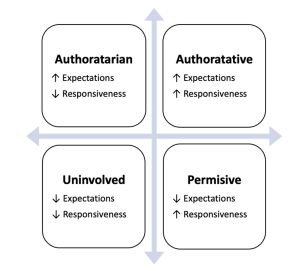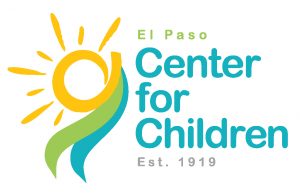The Four Parenting Styles
Written by Mel Gutierrez, BSN, RN
Overview
Style doesn’t end at fashion- it applies to raising children! Like fashion trends, parenting styles change over the years and seasons. Just like “one size fits all” clothing doesn’t actually fit everybody, there isn’t a single parenting style that is best for raising all children. El Paso Center for Children educates parents and caregivers on exploring and tailoring parenting styles that fit their family.
The main goals of parenting are to keep children healthy and happy and to help them grow into successful adults. Parenting style is the way that a parent navigates these two goals. It focuses on the combo of two parenting tasks- expectations and responsiveness.
Expectations are the rules a child is expected to follow.
- Parents with high expectations have rules they expect their children to follow. They also enforce the rules.
- Parents with low expectations may not have rules for their children to follow. Or they do not enforce the rules.
Responsiveness is how a parent responds to the wants and needs of children.
- Parents with high responsiveness consider the wants and needs of their children. They provide emotional support and warmth to their children.
- Low-responsive parents are indifferent to the wants and needs of their children.

Originally researchers identified three main styles of parenting based on these two tasks. They are authoritarian, authoritative, and permissive. Later study added the fourth, uninvolved.
Parenting experts have studied these styles since the 1960s. Decades of studies show that each style impacts a child’s behavior in different ways. Parents who follow the authoritative style tend to have the happiest and most successful children.
Children of authoritative parents are not immune to mental health problems or behavior issues. But they are more common in children with parents following the other three styles.
We change our fashion choices depending on the occasion (you’d never wear PJs to a wedding!) Parenting styles are the same way. Different styles may be appropriate depending on what is going on in a family’s life.
The following posts will explore the four styles in depth. The El Paso Center for Children is here to help tailor these styles to help all children grow up healthy and happy!
“Because I said so!” Authoritarian ParentingAuthoritarian parents say, “Because I said so”! If a child questions rules. It was a common style for earlier generations. These parents focus on obedience and believe that enforcing strict rules makes children become successful adults. Rules are often not negotiated or fully explained. Children are often expected to be high achievers in and out of school.
Rule-breaking leads to rigid punishments that might not relate to the broken rules. For example, children may not be allowed screen time if they don’t eat their vegetables.
At first glance, this style results in obedience. But this comes at the cost of problems such as:
- Low self-esteem due to not being allowed to voice their opinions, teaching them their thoughts don’t matter.
- Anger and resentment of the expectations they have no say in
- Rebelling at school or home, including breaking laws or substance abuse
- Only following rules when parents are around
- Aggression and violence
The negative effects are more common if physical punishments are the norm.
Authoritarian parenting is like using a sledgehammer. Sometimes, you need it. But, if a simple pair of scissors could do the job, the potential damage isn’t worth it.
An example of it being helpful is if a child breaks the rule about hands in a parking lot. There isn’t time to negotiate when safety is at risk. “Because I said so!” can be appropriate even if the child cries and screams about the unfair punishment of being carried instead of being allowed to run. It’s best to explain later why this is a rule when both parent and child are calm.
Authoritarian parents should work towards ensuring children understand the reasons behind the rules and allow them to ask “why” a rule is in place. When rules are enforced without reason, and consequences don’t match the bad behavior, learning the rules becomes about avoiding punishment.
For example, if “Clean your room 5 minutes after school or I’ll take your tablet away” is a household rule, switch to a logical consequence. If the rule is broken, this could be 10 minutes of cleaning the next day.
This makes sense because if you don’t do the dishes one night, there is double work the next day. This teaches the lesson of staying on top of household tasks.
Discussing rules with consequences helps children learn the lessons behind the rule. If the child asks if they could do it before bed instead of after school, allowing the rule to change also will enable children to feel heard and helps their self-esteem grow. While it’s working to change the way rules run, it’s work that helps children.
Experts do not recommend primarily using the authoritative parenting style. This does not mean people raised this way are damaged. Or that parents who have ever used are bad people. Parents do the best they can do with the information they have. This recommendation only reflects that learning newer techniques can help children become happy, well-adjusted adults while enjoying their childhood.
“Kids will be kids!” Permissive Parenting
Permissive parenting is the opposite of authoritarian parenting, with a “kids will be kids” approach. They avoid saying “no.” These parents want children to have a happy childhood without the restrictions of strict rules. These parents either do not have rules or do not enforce the rules they do have in place. They may even resort to bribery with toys and treats to encourage good behavior.
Parents using this style include their children in decision-making and ensure they know their opinions and wants matter. They give their children plenty of emotional support and warmth, which is fantastic! But the cost is that children see a parent as a friend rather than an authority figure.
But why is it bad for a parent to be a friend instead of an authority? It may seem that children crave the freedom to do whatever they want (especially when they are screaming about doing their chores) but, a life without rules doesn’t help children in the long run.
Children of permissive parents often have the following problems:
- Problems at school and bad grades
- Not understanding boundaries
- Trouble managing their emotions
- Being prone to aggression, especially when things aren’t going their way
- Bad relationships with peers
- Risk-taking behavior like breaking the law or substance abuse
Using a permissive style can be an appropriate tool. If a child is sick and the typical rule is no screen time before tidying up their room, it’s ok to relax the rules if they aren’t feeling well. But with so many possible adverse outcomes, primarily using permissive parenting is not recommended.
So what can a permissive parent do? The first step is to become comfortable dealing with an upset child. Challenging behavior often escalates when a child who is used to always getting their way starts to have limits. But with consistency and rules, it will get better. It can be helpful for a parent to practice mindfulness and relaxation techniques to help cope with the process.
Parents should create a basic and clear list of household rules and expectations with logical age-appropriate consequences. Having rules clearly laid out is the first step for them to be followed. It is essential to ensure follow-through with consequences. It’s important to be firm and fair. Also, try to catch and reward good behavior. It can be upsetting for children to feel they are only being punished during the transition. Providing special rewards for good behavior helps children feel appreciated.
The transition from focusing on permissive parenting takes hard work and consistency on the part of parents. It’s okay if the process does not go perfectly! But the hard work of establishing rules and consequences helps children thrive not only during childhood but as adults.
“Don’t ask me!” Uninvolved Parenting
The parenting style that is the most harmful for children typically isn’t a choice parents consciously make. These parents could be copying the uninvolved parenting they were raised with. Or, they might be so wrapped up in personal problems (like financial or mental health problems) that they lose track of their children’s needs.
These parents take the negative aspects of both permissive and authoritarian parents. They don’t have many expectations for their children’s behavior and don’t consider their children’s wants and needs. Children are forced to fend for themselves. This does not mean that busy parents are, by default, uninvolved. If a parent works very long hours but:
- Spends their free time with their children
- Makes sure that their children are cared for when they are away
They are not uninvolved. Children can tell if their parents care about them, even if they can’t be with them all the time.
This is the style of parenting that has the most negative impact on children, including:
- Low self-esteem because parents don’t take time to listen to their thoughts and feelings
- trouble managing their emotions and poor coping skills
- Increased Anxiety and stress from low family support
- Emotional withdrawal and increased rates of mental illness
- Fear of needing to depend on others, as they learned they could only rely on themselves
- Increased risky behavior like substance abuse and breaking the law
Take the example of the toddler refusing to put on socks. This parent may not even notice the child forgot to put on their socks before leaving home. Later, when the child is later crying about their feet hurting from a blister, they will let the child cry on their own.
These parents also don’t take the time to get to know their children. They don’t know what they’re doing in school or what their interests are. This isn’t because they are bad people. They may have grown up with uninvolved parents. Or, they may have extreme stress in their lives.
If a parent is worried they might be using the uninvolved style, there are many things they can do to fix the situation.
The first and most important step is to seek professional help. Seeking help does not make a person weak, and counseling can help anybody live a better life. Mental health is just like physical health and deserves time and attention.
Also, take time to learn more about parenting and healthy families. Parenting is a skill that takes time to learn how to do effectively, and people are willing to help you on the way. It’s never too late to make positive changes for a family.
Safe and Happy: Authoritative Parenting
The Authoritative Parenting style is recommended by childhood development experts. It is the Goldilocks approach. It combines the emotional warmth of the permissive style and the focus on the discipline of the authoritarian style. These children feel secure because they understand that their parents, who care about them and their happiness, are in charge. They know they are being cared for.
Children raised with this style experience many benefits, including:
- Strong attachment and good relationships with parents
- High levels of responsibility and ability to make good decisions
- Greater ability to get along well with others and fit in social groups
- Have positive personality traits like empathy, warmth, and kindness
- Respect for other people and the rules
- Able to resist peer pressure
- Ability to respond to their emotions in a healthy way
Authoritative parenting is challenging work. A parent needs to be consistent about enforcing rules with reasonable consequences. At the same time, they need to respectfully listen to their child’s perspectives. Even when explaining for the hundredth time why socks are put on before shoes when their toddler forgets a parent must still:
- Empathetically listen to a toddler’s logic about why they do not need their socks
- Explain why they still must follow the rule of wearing shoes before socks (we can get ouchies and stinky feet without socks!)
- Take the time to have them go back to put on the socks on their own, even if they are crying about not wanting to do it
- Enforce the logical consequence if the rule still isn’t followed. For example, the consequence could be if a parent puts on clothes for a child, they lose some screen time for the day, like one less episode of their TV show. This is a logical consequence of the extra time spent getting ready has to be made up later.
- Empathize with the now crying toddler who is upset about the consequence of the broken rule. Not just in the moment but when the rule is later enforced when their screen time is limited.
This may happen when the parent is running late for work and needs to get the toddler to daycare. So it’s very easy for parents to then slide into the other styles.
An authoritarian slide might have the parent yell at the toddler about breaking the rule. They would then put their socks and shoes on without listening to their child’s perspective. Long term, this may damage the child’s self-esteem as they learn that their opinions don’t matter.
A permissive slide would allow the child to break the rule about wearing their socks (well, kids will be kids). Or, they may go through most steps but not enforce the consequence of less playtime later. Long term, this can result in more rebellion because they know they’ll eventually get their way.
No parent can be perfect all of the time. This is ok! But the conscious effort to work towards authoritative parenting is worth it for all the benefits it provides children as they grow.
The El Paso Center for Children has several programs and access to numerous community resources to help navigate and cherish family time. For questions, please contact us at 915.307.8043 or info@epccinc.org.
The written information comes from my registered nurse education and baccalaureate psychology education. It is only intended for educational purposes. The information written for this blog is not a substitution for professional medical advice or therapy services.





